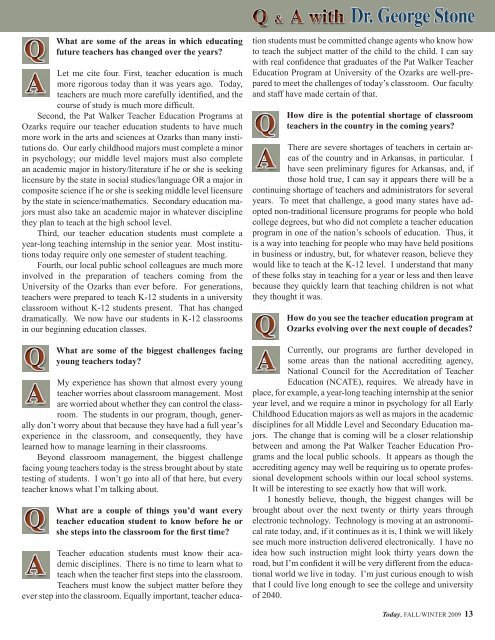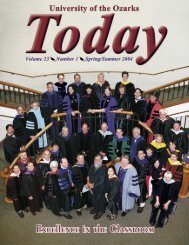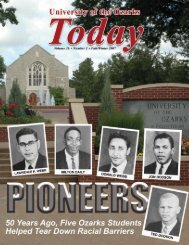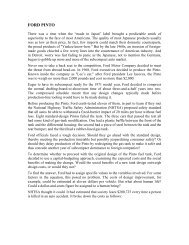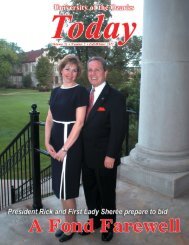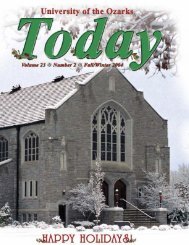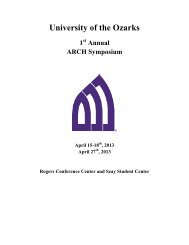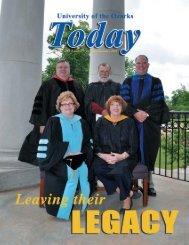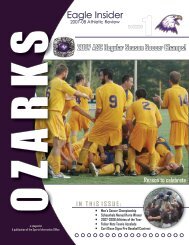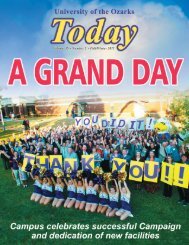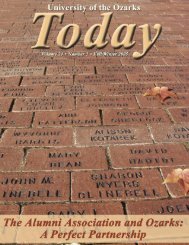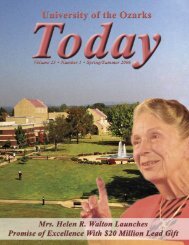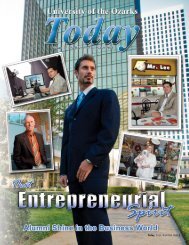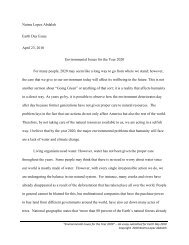Download - University of the Ozarks
Download - University of the Ozarks
Download - University of the Ozarks
Create successful ePaper yourself
Turn your PDF publications into a flip-book with our unique Google optimized e-Paper software.
What are some <strong>of</strong> <strong>the</strong> areas in which educating<br />
future teachers has changed over <strong>the</strong> years<br />
Let me cite four. First, teacher education is much<br />
more rigorous today than it was years ago. Today,<br />
teachers are much more carefully identified, and <strong>the</strong><br />
course <strong>of</strong> study is much more difficult.<br />
Second, <strong>the</strong> Pat Walker Teacher Education Programs at<br />
<strong>Ozarks</strong> require our teacher education students to have much<br />
more work in <strong>the</strong> arts and sciences at <strong>Ozarks</strong> than many institutions<br />
do. Our early childhood majors must complete a minor<br />
in psychology; our middle level majors must also complete<br />
an academic major in history/literature if he or she is seeking<br />
licensure by <strong>the</strong> state in social studies/language OR a major in<br />
composite science if he or she is seeking middle level licensure<br />
by <strong>the</strong> state in science/ma<strong>the</strong>matics. Secondary education majors<br />
must also take an academic major in whatever discipline<br />
<strong>the</strong>y plan to teach at <strong>the</strong> high school level.<br />
Third, our teacher education students must complete a<br />
year-long teaching internship in <strong>the</strong> senior year. Most institutions<br />
today require only one semester <strong>of</strong> student teaching.<br />
Fourth, our local public school colleagues are much more<br />
involved in <strong>the</strong> preparation <strong>of</strong> teachers coming from <strong>the</strong><br />
<strong>University</strong> <strong>of</strong> <strong>the</strong> <strong>Ozarks</strong> than ever before. For generations,<br />
teachers were prepared to teach K-12 students in a university<br />
classroom without K-12 students present. That has changed<br />
dramatically. We now have our students in K-12 classrooms<br />
in our beginning education classes.<br />
What are some <strong>of</strong> <strong>the</strong> biggest challenges facing<br />
young teachers today<br />
My experience has shown that almost every young<br />
teacher worries about classroom management. Most<br />
are worried about whe<strong>the</strong>r <strong>the</strong>y can control <strong>the</strong> classroom.<br />
The students in our program, though, generally<br />
don’t worry about that because <strong>the</strong>y have had a full year’s<br />
experience in <strong>the</strong> classroom, and consequently, <strong>the</strong>y have<br />
learned how to manage learning in <strong>the</strong>ir classrooms.<br />
Beyond classroom management, <strong>the</strong> biggest challenge<br />
facing young teachers today is <strong>the</strong> stress brought about by state<br />
testing <strong>of</strong> students. I won’t go into all <strong>of</strong> that here, but every<br />
teacher knows what I’m talking about.<br />
What are a couple <strong>of</strong> things you’d want every<br />
teacher education student to know before he or<br />
she steps into <strong>the</strong> classroom for <strong>the</strong> first time<br />
Teacher education students must know <strong>the</strong>ir academic<br />
disciplines. There is no time to learn what to<br />
teach when <strong>the</strong> teacher first steps into <strong>the</strong> classroom.<br />
Teachers must know <strong>the</strong> subject matter before <strong>the</strong>y<br />
ever step into <strong>the</strong> classroom. Equally important, teacher education<br />
students must be committed change agents who know how<br />
to teach <strong>the</strong> subject matter <strong>of</strong> <strong>the</strong> child to <strong>the</strong> child. I can say<br />
with real confidence that graduates <strong>of</strong> <strong>the</strong> Pat Walker Teacher<br />
Education Program at <strong>University</strong> <strong>of</strong> <strong>the</strong> <strong>Ozarks</strong> are well-prepared<br />
to meet <strong>the</strong> challenges <strong>of</strong> today’s classroom. Our faculty<br />
and staff have made certain <strong>of</strong> that.<br />
How dire is <strong>the</strong> potential shortage <strong>of</strong> classroom<br />
teachers in <strong>the</strong> country in <strong>the</strong> coming years<br />
There are severe shortages <strong>of</strong> teachers in certain areas<br />
<strong>of</strong> <strong>the</strong> country and in Arkansas, in particular. I<br />
have seen preliminary figures for Arkansas, and, if<br />
those hold true, I can say it appears <strong>the</strong>re will be a<br />
continuing shortage <strong>of</strong> teachers and administrators for several<br />
years. To meet that challenge, a good many states have adopted<br />
non-traditional licensure programs for people who hold<br />
college degrees, but who did not complete a teacher education<br />
program in one <strong>of</strong> <strong>the</strong> nation’s schools <strong>of</strong> education. Thus, it<br />
is a way into teaching for people who may have held positions<br />
in business or industry, but, for whatever reason, believe <strong>the</strong>y<br />
would like to teach at <strong>the</strong> K-12 level. I understand that many<br />
<strong>of</strong> <strong>the</strong>se folks stay in teaching for a year or less and <strong>the</strong>n leave<br />
because <strong>the</strong>y quickly learn that teaching children is not what<br />
<strong>the</strong>y thought it was.<br />
How do you see <strong>the</strong> teacher education program at<br />
<strong>Ozarks</strong> evolving over <strong>the</strong> next couple <strong>of</strong> decades<br />
Currently, our programs are fur<strong>the</strong>r developed in<br />
some areas than <strong>the</strong> national accrediting agency,<br />
National Council for <strong>the</strong> Accreditation <strong>of</strong> Teacher<br />
Education (NCATE), requires. We already have in<br />
place, for example, a year-long teaching internship at <strong>the</strong> senior<br />
year level, and we require a minor in psychology for all Early<br />
Childhood Education majors as well as majors in <strong>the</strong> academic<br />
disciplines for all Middle Level and Secondary Education majors.<br />
The change that is coming will be a closer relationship<br />
between and among <strong>the</strong> Pat Walker Teacher Education Programs<br />
and <strong>the</strong> local public schools. It appears as though <strong>the</strong><br />
accrediting agency may well be requiring us to operate pr<strong>of</strong>essional<br />
development schools within our local school systems.<br />
It will be interesting to see exactly how that will work.<br />
I honestly believe, though, <strong>the</strong> biggest changes will be<br />
brought about over <strong>the</strong> next twenty or thirty years through<br />
electronic technology. Technology is moving at an astronomical<br />
rate today, and, if it continues as it is, I think we will likely<br />
see much more instruction delivered electronically. I have no<br />
idea how such instruction might look thirty years down <strong>the</strong><br />
road, but I’m confident it will be very different from <strong>the</strong> educational<br />
world we live in today. I’m just curious enough to wish<br />
that I could live long enough to see <strong>the</strong> college and university<br />
<strong>of</strong> 2040.<br />
Today, FALL/WINTER 2009 13


